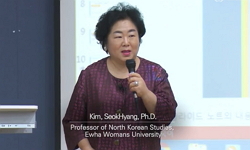This article offers a critical analysis of the survival strategies employed by North Korean defector women during the state-orchestrated famine and systemic collapse of the 1990s, while interrogating the discursive and material conditions under which ...
http://chineseinput.net/에서 pinyin(병음)방식으로 중국어를 변환할 수 있습니다.
변환된 중국어를 복사하여 사용하시면 됩니다.
- 中文 을 입력하시려면 zhongwen을 입력하시고 space를누르시면됩니다.
- 北京 을 입력하시려면 beijing을 입력하시고 space를 누르시면 됩니다.

발화될 수 없는 삶들―탈북 여성, 재난, 그리고 증언의 정치― = Unspeakable Lives―North Korean Defector Women, Disaster, and the Politics of Testimony―
한글로보기부가정보
다국어 초록 (Multilingual Abstract)
This article offers a critical analysis of the survival strategies employed by North Korean defector women during the state-orchestrated famine and systemic collapse of the 1990s, while interrogating the discursive and material conditions under which their lives have been articulated and represented. Rather than construing these women solely as passive victims of deprivation and hunger, the study conceptualizes them as complex, intersectional subjects shaped by layered structures of oppression. Positioned at the nexus of a divided political system, gendered hierarchies, affective governance, and subsistence economies, these women emerge not merely as casualties of structural violence but as agents of endurance and negotiation. Adopting this framework, the article examines the modalities through which their experiences become narratable—through documentary films, autobiographical narratives, and published testimonies—and explores how these narrative forms are entangled with mechanisms of political authority, affective capital, and state surveillance. Special emphasis is placed on the act of “testimony,” approached not merely as a medium of truth-telling, but as a dispositif that is subject to commodification, affective regulation, and institutional framing within the broader dynamics of biopolitical governance. Simultaneously, the article foregrounds the resistant subjectivity of defector women, which exceeds reductive paradigms of victimhood and gestures toward the ethical and political significance of unarticulated suffering. Through this lens, the study seeks to theorize the representational conditions under which “lives that cannot be spoken” might nonetheless be rendered speakable—at the intersection of the politics of voice and the regimes of representation.
동일학술지(권/호) 다른 논문
-
『변법통의(變法通議)』의 전파와 역술, 『서우(西友)』와 『대한협회회보(大韓協會會報)』에서
- 국제한국문학문화학회
- 임상석
- 2025
- KCI등재
-
‘김명순(金明淳)’과 그의 시대―필명 ‘김련(金蓮)’과 새 자료를 기반으로―
- 국제한국문학문화학회
- 남은혜
- 2025
- KCI등재
-
고립과 폭력의 지정학을 통해서 본 로컬의 정체성 구성―현기영의 역사소설을 중심으로―
- 국제한국문학문화학회
- 최다의
- 2025
- KCI등재
-
김인환 선생님과의 대화―분할을 넘어서, 삶으로서의 공부―
- 국제한국문학문화학회
- 김인환
- 2025
- KCI등재
분석정보
연관 공개강의(KOCW)
-

(방송) 위대한 수업4(GREAT MINDS) - 저출생, 워킹맘, 극우 그리고 신자유주의
K-MOOC EBS 조앤 윌리엄스 -

(MOOC) 위대한 수업4(GREAT MINDS) - 저출생, 워킹맘, 극우 그리고 신자유주의
K-MOOC EBS 조앤 윌리엄스 -

(더빙) 위대한 수업4(GREAT MINDS) - 저출생, 워킹맘, 극우 그리고 신자유주의
K-MOOC EBS 조앤 윌리엄스 -

(수어) 위대한 수업4(GREAT MINDS) - 저출생, 워킹맘, 극우 그리고 신자유주의
K-MOOC EBS 조앤 윌리엄스 -

Ewha-HCAP Special Lecture : Stories on People from North Korea ewhauniv
이화여자대학교 김석향




 KCI
KCI KISS
KISS

